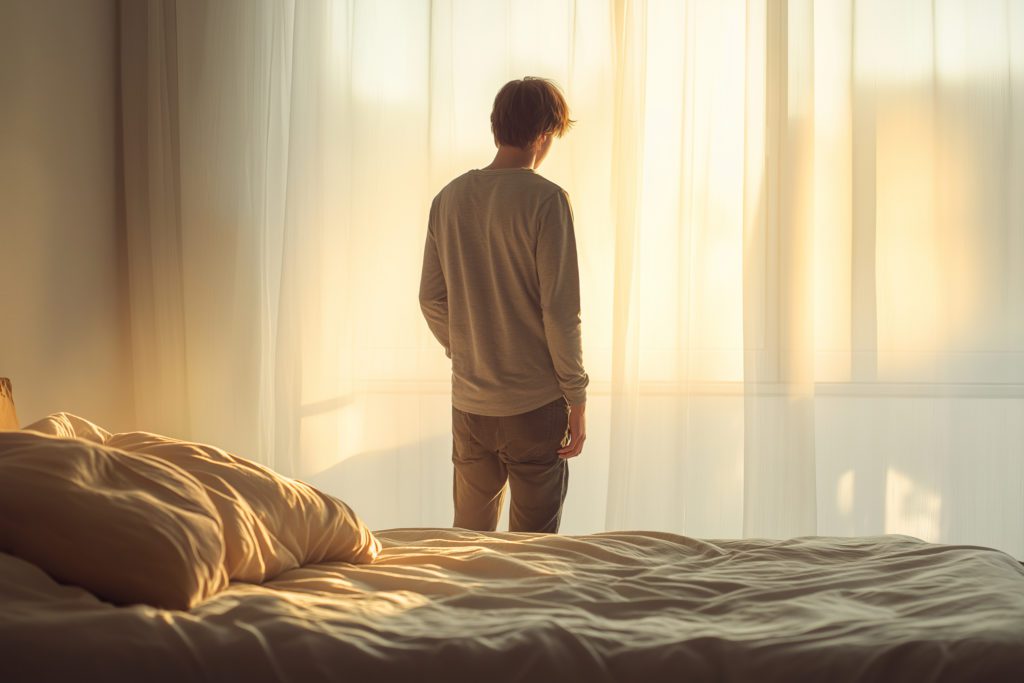
Understanding Postnasal Drip and Its Impact on Sleep Quality
Post-nasal drip is often worse at night and can interfere with a good night’s sleep. Learn about the symptoms of post-nasal drip and what you can do to reduce it.

When your body produces too much mucus or can’t clear it fast enough, the mucus can drip down the back of your nose and gather in your throat causing coughing and other symptoms. This is called post-nasal drip. Having some mucus in the back of your throat is perfectly normal. It helps moisten and clear your nasal passages, as well as protect you from illnesses. However, when too much mucus drips down your throat, it can be quite bothersome, and cause problems with sleeping.
This article will explain some of the common causes of post-nasal drip, as well as symptoms and how to sleep better if you have this condition.
Causes of Post-Nasal Drip
Post-nasal drip can be caused by many things. Probably the most common cause of this condition is seasonal allergies or colds. Other causes include:
- Sinus infections - A runny nose is common with sinus infections. This can cause post-nasal drip.
- Chronic acid reflux (GERD) - Post-nasal drip is a major symptom of GERD.
- Colds and flu - When you are sick with a cold or the flu, your body produces excess mucus, which can drain down your throat at night.
- Spicy foods - Your body responds to spicy foods by producing mucus.
- Bright lights - These trigger the body to produce extra mucus.
- Pregnancy - Hormones during pregnancy cause the nasal glands to swell. This triggers post-nasal drip.
- Medications - Nonsteroidal anti-inflammatory drugs (NSAIDs), birth control pills, and blood pressure medications can cause post-nasal drip.
Symptoms
The most common symptom of post-nasal drainage is having mucus drain down the back of your throat. Other symptoms include:
- A tickle in the back of the throat
- Frequent swallowing
- An urge to clear your throat
- Coughing that worsens at night
- Nausea
- Sore throat
Post-Nasal Drip and Sleep
Many of the symptoms of post-nasal drip are disruptive to sleep. And, post-nasal drip tends to worsen at night. Having mucus draining into your throat and feeling the need to cough can wake you up from a sound sleep. You may wake dozens of times due to these symptoms. Or, you might struggle to fall asleep in the first place.
How to Sleep Better With Post-Nasal Drip
Sleeping can be a challenge when you have a post-nasal drip. Yet, getting enough sleep is important. Your body needs rest. Fortunately, there are some things that you can do to get post-nasal drip under control. You can try several of these things at once.
- Treat allergies - You may need to take an antihistamine like Claritin or Zyrtec to manage allergies. If allergies are severe, you may want to talk to your doctor about allergy shots.
- Remove allergens - If you have pets, don’t allow them to sleep with you. Wash your bedding on a regular basis to get rid of dander and other allergens.
- Use a steroid nasal spray - Common over-the-counter (OTC) steroid nasal sprays include Flonase and Nasacort. These work by decreasing drainage and inflammation in the nasal passages. This can help you sleep better. They work quickly so if you take them a couple hours before bed, you should get relief by bedtime.
- Do a nasal rinse - Saline nasal irrigation can help clear out mucus. Before bed, rinse your nasal passages with a saline spray or use a Neti pot. Just make sure you don’t use water from the tap in your Neti pot. You should only use sterile or distilled water.
- Cut out alcohol and caffeine - These substances can make acid reflux worse, and thus trigger post-nasal drip.
- Don’t eat right before bedtime - Eating right before bed can make GERD worse if that’s the cause of your post-nasal drip. Eat dinner at least three hours before you go to bed.
- Take a shower before bed - If you have spent time outdoors, then shower before you go to bed. This will help remove any pollen from your body. The hot steam from the shower will also help thin and drain mucus from your sinuses.
- Drink more water - This can help thin secretions and reduce post-nasal drip. The Harvard School of Public Health recommends nine cups of water for women a day and 13 for men. Also, try to eat water-rich foods, like watermelon and strawberries.
- Sleep with your head elevated - A slight elevation will help prevent mucus from pooling in the back of your throat. You can prop your head up with an extra pillow or use a wedge pillow.
- Avoid bright lights - Bright lights can interfere with sleep because they reduce melatonin production. They can also trigger post-nasal drip. Therefore, use a soft lamp in your bedroom.
- Don’t smoke - It can be hard to quit smoking. But doing so can help post-nasal drip, as cigarette smoke can increase mucus secretions.
- Avoid this sleeping position - The worst sleeping position if you have post-nasal drip is lying flat on your back. This can trigger coughing. It doesn’t matter which side you sleep on, just avoid lying on your back.
- Drink hot tea before bedtime - Sipping on a warm cup of decaffeinated tea about 60 minutes before bed can help you relax and be prepared for sleep. It can also help with post-nasal drip, especially if the tea has honey. The honey will coat the throat making it less likely that you will cough while you are trying to sleep.
When Should You Call a Doctor?
In most cases, post-nasal drip is due to allergies or a viral infection, but it may sometimes be caused by a bacterial infection or in very rare cases, a cerebrospinal fluid (CSF) leak. That’s why it's important to follow up with a doctor if things aren’t getting better. Consider calling your physician if you have:
- A fever lasting more than 3 days
- Symptoms that don’t improve after 10 days
- Thick smelly yellow mucus
- Severe interruptions in sleep
- Shortness of breath
- Post nasal drip that has a salty taste
- Severe headaches
In short, if you are experiencing post-nasal drip and nothing that you are doing seems to help, call your doctor.
Treat Post-Nasal Drip for a Better Night’s Sleep
Post-nasal drip is annoying, and it can seriously interfere with your sleep. Many things can cause post-nasal drip including sinus problems, allergies, and acid reflux. There are numerous things you can do to address post-nasal drip and sleep better, including treating allergies and using steroid nasal sprays.

Written by
Emily Mendez
Emily Mendez is a former therapist and mental health author. She is one of the leading voices in mental health. Emily's writing has appeared in eCounseling, SonderMind, and more. Emily is frequently interviewed by Healthline, Fatherly, INSIDER, Family Circle, and other national media for her advice and expert opinion on the latest mental health topics.
Download Pillow
Get help
Press & News
Legal
Connect
X (Twitter)
Company
Copyright © Neybox Digital Ltd.



